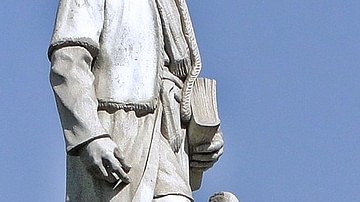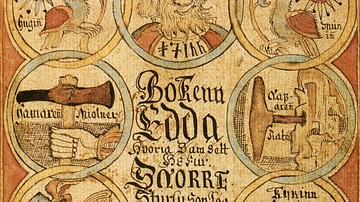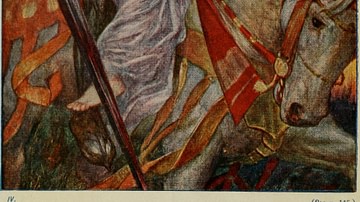Search
Search Results

Definition
Eleanor of Aquitaine
Eleanor of Aquitaine (l. c. 1122-1204 CE) was one of the most impressive and powerful figures of the High Middle Ages (1000-1300 CE) – male or female – whose influence shaped the politics, art, medieval literature, and perception of women...

Definition
Ferdowsi
Abolqasem Ferdowsi (l. c. 940-1020 CE, also given as Abul-Qasem Ferdowsi Tusi, Firdawsi, Firdausi) is the author of the Shahnameh (The Persian Book of Kings), one of the greatest works of world literature and the national epic of Iran. He...

Definition
Edda
Edda is a term used to describe two Icelandic manuscripts that were copied down and compiled in the 13th century CE. Together they are the main sources of Norse mythology and skaldic poetry that relate the religion, cosmogony, and history...

Article
Gilgamesh and the Bull of Heaven
Gilgamesh and the Bull of Heaven is a Sumerian poem relating the event, now famous from The Epic of Gilgamesh, in which the goddess Inanna/Ishtar sends the celestial bull to attack Gilgamesh after he has rejected her advances. The epic changes...

Definition
Christopher Marlowe - Poet, Playwright, Spy
Christopher Marlowe (1564-1593), or Kit Marlowe, was a poet and playwright of the English Renaissance who wrote during the Elizabethan Era (1558-1603). His mastery of the blank verse – unrhymed iambic pentameter – transformed the way plays...

Definition
Shahnameh
The Shahnameh (“Book of Kings”, composed 977-1010 CE) is a medieval epic written by the poet Abolqasem Ferdowsi (l. c. 940-1020 CE) in order to preserve the myths, legends, history, language, and culture of ancient Persia. It is the longest...

Definition
Richard Wagner
Richard Wagner (1813-1883) was a German composer of Romantic music most famous for his epic operas like The Ring, Tannhäuser, and Tristan and Isolde. Wagner was concerned throughout his career with the theme of redemption through love and...

Definition
Muse
In Greek mythology, the nine Muses are goddesses of the various arts such as music, dance, and poetry. Blessed with wonderful artistic talents, they also possess great beauty, grace, and allure. Their gifts of song, dance, and joy helped...

Definition
Guinevere
Guinevere is the Queen of Britain, wife of King Arthur, and lover of Sir Lancelot in the Arthurian Legends best known in their standardized form from Sir Thomas Malory's Le Morte D'Arthur (1469 CE). She first appears in Geoffrey of Monmouth's...

Definition
Odin
Odin (Old Norse: Óðinn) is the main god in Norse mythology. Described as an immensely wise, one-eyed old man, Odin has by far the most varied characteristics of any of the gods and is not only the deity to call upon when war was being prepared...